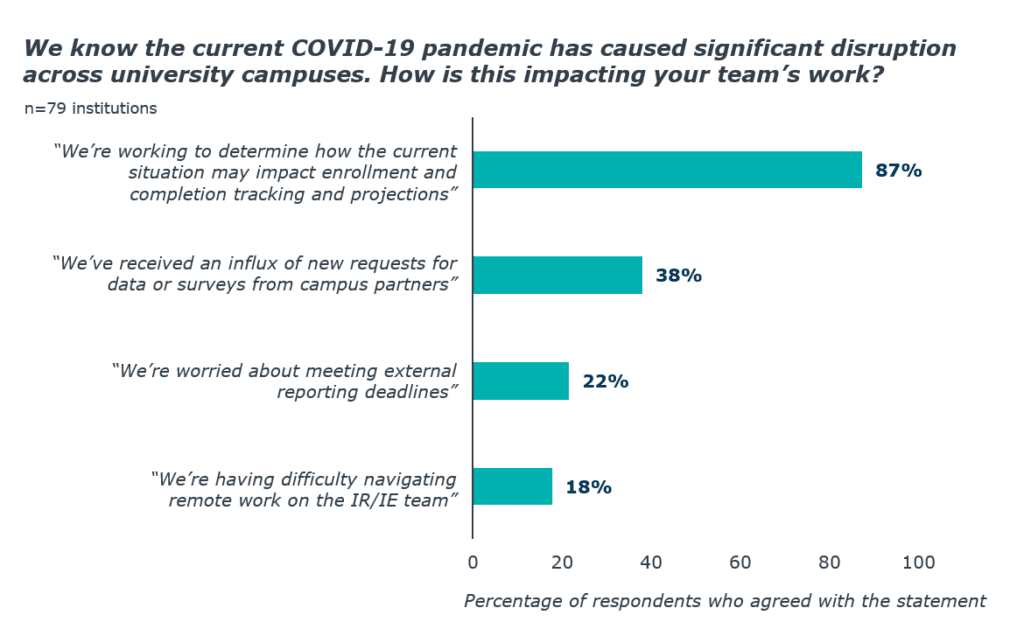The impact of COVID-19 on institutional research and effectiveness offices
For me, the relentless stream of COVID-19 information has made the news cycle unbearable and disorienting: it feels like the medical, social, and economic health of the world is in free fall. I’m fortunate to be working from home with a data-savvy partner who can cut through the noise and help me process it all (though I must admit I’m not thrilled to be sharing my wireless connection with someone whose computer is connected to large genomic datasets every day).
In this environment, with campus leaders facing a whirlwind of operational changes in addition to the confusion surrounding viral and economic shifts filling up the news, institutional research (IR) and institutional effectiveness (IE) leaders are taking center stage to help their institutions navigate amidst the upheaval.
At EAB, we’ve been tracking the expanding role of IR and the rise of IE in our work to help campuses achieve better data management. In addition to hosting roundtable discussions for small groups of IR/IE leaders to share and collaborate on emerging data challenges, we conducted a pulse survey to assess IR and IE’s priorities—as well as immediate needs amid the COVID-19 response. Ninety IR and IE leaders from across North America responded, and together their voices paint a picture of proactivity in the face of ongoing uncertainty. Here’s what we found.
IR and IE quickly pivoted to considering the longer-term impacts of the coronavirus…
When it comes to COVID-19, IR and IE leaders overwhelmingly indicated that they’re looking ahead to the implications of the current environment on their student pipelines: 87% of respondents have already begun work to understand how the current situation may impact enrollment and completion tracking and projections.
Yet while IR teams are building models to make sense of the changing landscape and the sentiments of prospects and students, they’re also concerned about data integrity issues that may stem from the large scale operational disruptions that most institutions have faced. Respondents cited a concern around holes in longitudinal data with many surveys cancelled, courses transformed, and assessments interrupted. Colleges and universities have also needed to circumvent established processes (e.g., adjusting student evaluation and grading policies) which may have broader implications for analysis and reporting in the months to come.
…but growing demand and remote realities have stretched IR and IE teams even thinner
IR and IE units are seeing new requests related to campus responses to COVID-19: 38% reported that they have received an influx of new requests for data and surveys from campus partners, while others are considering the potential workload spike with changing government reporting in the aftermath of the crisis. These unplanned and urgent projects are far exceeding some teams’ capacity to deliver.
For some IR groups, entirely new areas of responsibility have emerged, too, including facilitating the delivery and assessment of online instruction —and while staff are happy to contribute, one leader stressed that these changes are inevitably to the detriment of IR’s current core goals in data governance and management.
Too Much Tech? Here’s How a Data Management Platform Can Help
-
38%
of survey respondents indicate they’ve received an influx of data and survey requests in the wake of COVID-19
In addition to these new requests, 18% of IR leaders reported facing challenges in navigating the work-from-home environment. Some analysts pointed to inaccessible data sets and slower processing capacity while working off campus, while others highlighted the strains caused by unavailability among usual support structures: many student assistants are no longer able to assist, while partners in the IT organization have been otherwise engaged in their own support of the shift to remote learning.

Re-invigorating campus confidence in data strategy
Despite the varied experiences of units on individual campuses, one thing has remained consistent across the groups we have surveyed and engaged: whether conducting “business as usual” or taking on a plethora of new tasks and projects, IR and IE groups are providing the connective tissue to help their institutions make sense of the current situation.
IR has always partnered with other leaders to connect the dots on a strategic path forward, but IR and IE leaders have seen in this moment an increased appreciation for the wealth of data that their units curate. They’re confident that, when the dust settles, the wide-ranging reliance on data to build connectedness and coherence in campuses’ COVID responses will inject a renewed vigor into supporting broader campus data strategy.
More Blogs

Was the impact of remote instruction as bad as we feared? Here’s what the data shows

Q&A: Why one university brought data strategy into the cabinet
